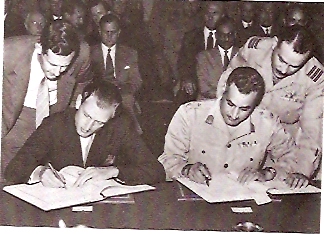| Egypt- A Nation Divided |
The Muslim Brotherhood Under Hasan-al-Banna: "Memorize the Quran in the state schools- this condition will be essential in order to obtain diplomas with a religious or philosophical specialty- in every school students should learn part of the Quran" (The Muslim Brotherhood, "Toward the Light", 210). This quote emphasizes the call of the Muslim Brotherhood for the revival of identity, culture, and religious knowledge through the learning of the Quran. The Muslim Brotherhood was found in 1929 and served as an important social, political, economy, educational, and religious movement designed to remove all things and bad influences/practices attributed to western custom from Egyptian society. The Muslim Brotherhood’s influence was not only limited to Egyptian society but to Arab society as a whole. Public works such as mosques, schools, small hospitals, youth programs, social clubs, and handicraft industries were all promoted and created under the hand of Hasan al-Banna. Among the good also came the bad. The Muslim Brotherhood also had links to assignations on prominent Egyptian leaders, and would later fund resistant movements such as Islamic Jihad and Hamas who were fervurently opposed to the Israeli state. The competition for political power was often brutal as it was directed to European occupiers and Egyptian secular nationals alike. (Overfield, 207) |
 Figure 1-3 The Anglo-Egyptian Treat. The photo shows Egyptian president Gamal Abdel Nasser signing the Anglo-Egyptian Treat with the British minister of state in 1954. This afreement ended the stationing of British troops on Egyptian soil and specifically called for the withrawal of British troops stationed at the Suez Canal military base. Shortly after the last British soldiers left Egypt in early 1956, however, Britain invaded the country in a vain effort to block Nasser's nationalization of the Suez Canal Company and to topple the Eyptian leader from power. (Tignor, 407) |
| Free Office's Movement Under Abdel Nasser: Abdel Nasser of the Free Officers had ties to the Muslim
Brotherhood and other groups under the rule of King Faruq. As head of the
military forces, |
|
|